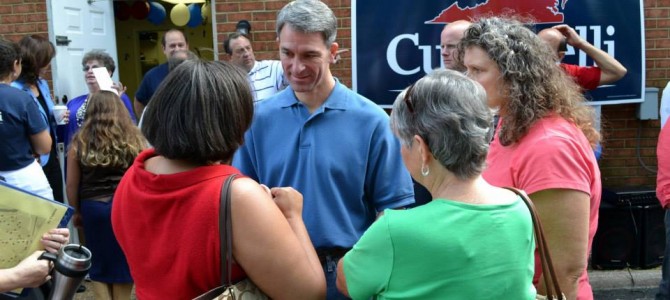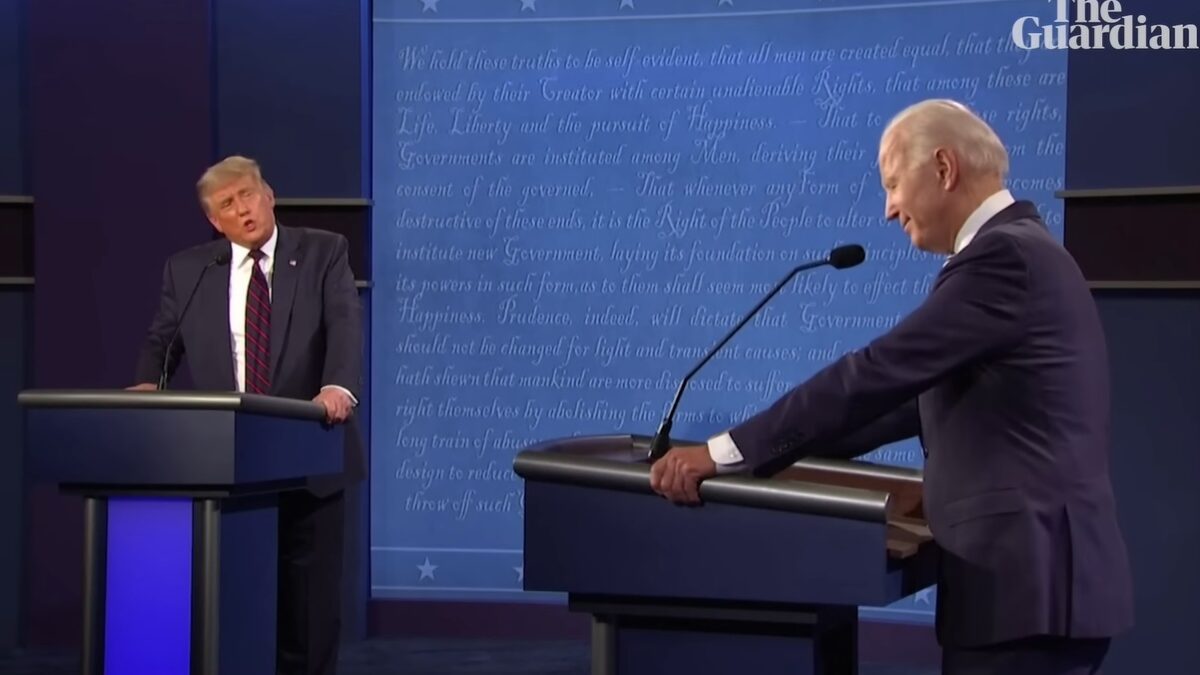
Virginia Attorney General Ken Cuccinelli has for much of the past few months been battling against a media narrative which frames him as some kind of Old Dominion Todd Akin – an extreme social conservative candidate who has split his party, dividing the moderate and conservative wings, and creating wedges vulnerable for exploitation by a centrist, pro-business Democrat. This narrative was sustained through most of August, fueled in part by the dramatically higher ad expenditures of Cuccinelli’s well-funded opponent, lifelong Democratic fundraiser Terry McAuliffe.
Except this narrative has crumbled in recent weeks, at the same time that Cuccinelli has cut McAuliffe’s polling lead in half.
Why? Well, for anyone paying attention to the race, it’s obvious: McAuliffe spent, and spent big, to win August – pushing more than $8 million in ad buys and expenditures across the state to attack Cuccinelli as a retromingent throwback. But at the end of all that, McAuliffe – who has low name ID and no electoral history — only ended up about 7 points ahead in a race with a third party candidate.
The past three weeks have been rough for McAuliffe. He’s bungled basic answers to press queries, made out-of-touch comments about how he would govern, but most egregiously of all, his campaign exploded into a tantrum of threatening rage when denied an endorsement from the Northern Virginia Tech Council that he had assumed was in the bag (despite not preparing at all for the tech gurus’ interview, or even knowing their basic policy issues). McAuliffe himself now denies he knew anything about the pressure brought on the endorsement, a suggestion which doesn’t pass the laugh test.
At the same time, Cuccinelli has had three straight weeks of good news. Beyond the NVTC endorsement – usually the provenance of centrist, pro-business candidates – he’s been getting the backing of a host of moderate and centrist Republicans. At a fundraiser the other night, Cuccinelli had a bevy of establishment supporters lining up behind him and decrying McAuliffe’s cronyist approach to governance, with endorsements from Ed Gillespie, Spence Abraham, Charlie Black, Jim Nicholson, Don Nickles, Fred Malek, Paul Laxalt, Pete Fitzgerald, Dirk Kempthorne, Marji Dannenfelser, and most prominently Jeb Bush. Bush gave a full-throated endorsement to Cuccinelli, decrying McAuliffe as the worst sort of politician you could see – in either party.
The effect of this backing from moderate, centrist Republicans has mitigated the damage from Bill Bolling, the ineffectual and largely unknown GOP lieutenant governor whose sour grapes have become the fodder for so many media stories designed to frame Cuccinelli as too extreme for the state. Bolling, whose name ID is extremely marginal for an official who has held statewide office for six years, has described himself as representing “Main Street”, and lobbied the NVTC to actively reconsider their endorsement of Cuccinelli in favor of McAuliffe – a far cry from the days when Bolling represented himself as a strongly pro-life, anti-tax conservative.
Many Virginia Republicans now expect Bolling to endorse McAuliffe in the waning days of the campaign in an obvious attempt to secure a cabinet position. Bolling’s problem, though, is that there is no constituency for his position: establishment Republicans are lined up behind Cuccinelli, not donating to Bolling’s fledgling Main Street PAC. There is no Terry McAuliffe wing of the Virginia Republican Party, and Bolling – and the analysts who viewed his role as significant – was in error to assume otherwise. Whether Cuccinelli wins or not, the lieutenant governor now has no political future in electoral office.
As for Cuccinelli, he’s used to being the underdog. He has been outspent in every single election he’s ever run – and he’s won them all, even in extremely competitive Northern Virginia, where Republicans are few and far between. In part, this is because he’s a better retail politician than people recognize. But this gubernatorial race is turning into Cuccinelli’s biggest challenge yet: McAuliffe will likely have raised double the amount of Cuccinelli’s campaign by election day, fueled by donations from outside the Commonwealth. The question is how much backing that money can buy. Insiders are already predicting an election with historically low turnout, and Cuccinelli’s active grassroots machine has delivered him to several victories by overperforming.
The question may come down to the actual dedication to the third party candidate, libertarian Robert Sarvis. Virginia has a thriving libertarian wing, driven by a significant home schooling population and a healthy movement of former Ron Paul supporters (two of whom knocked off two long-serving Virginia legislators who had violated their anti-tax pledges by supporting McDonnell’s transportation tax plan). But there is little public evidence of Sarvis’s campaign to justify his poll position. Privately, some Virginia political observers say Sarvis would be doing better were he not pro-choice, given that many of the libertarian-minded Virginia voters are pro-life Christians. Today, Sarvis has less than $20,000 on hand in his latest financial reports, and some polling experts view him as little more than a substitute “none of the above” vote. As Larry Sabato notes:
Despite the damaged nature of both major-party nominees, it would be surprising if Sarvis maintained that level of support — third-party candidates often poll much better than they actually perform on Election Day. Aside from Henry Howell’s independent run in 1973 (49.3%), no independent or third-party gubernatorial candidate has done better than Russ Potts’ 2.2% in 2005 in the modern era of Virginia politics (dating back to the start of true two-party competition in 1969).
Sarvis may yet break with history. But if Sabato and others are right, and Sarvis’s 7 percent in the latest Quinnipiac poll is not reflective of a rising candidacy so much as dislike for the main two party candidates, then this is a race that will likely come down not to television ad campaigns, but simply to whose base-motivating machine is better – a test that could serve as a preview for 2016. Cuccinelli’s window of opportunity is now: he’s closed the gap from a 6-8 point McAuliffe lead to a 3 point lead even including the third party candidate at face value; he’s coalesced support among the establishment and moderate Republican communities in Northern Virginia; and his opponent is beginning to show the signs of being an inexperienced candidate. Written off a month ago, Cuccinelli now has a puncher’s chance – he just has to deliver the right blows.







